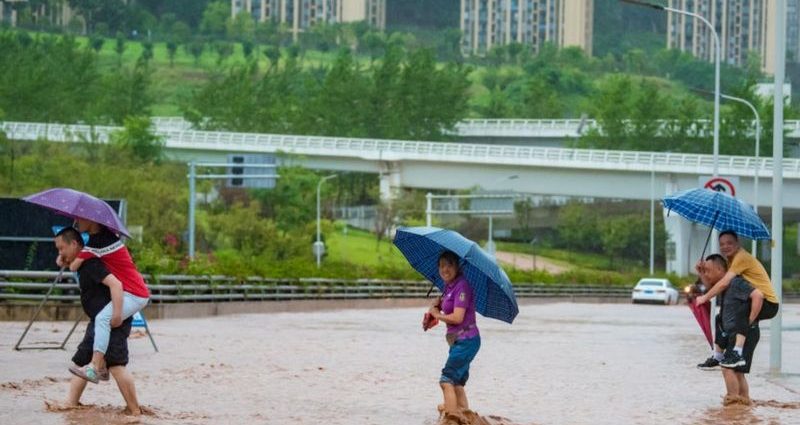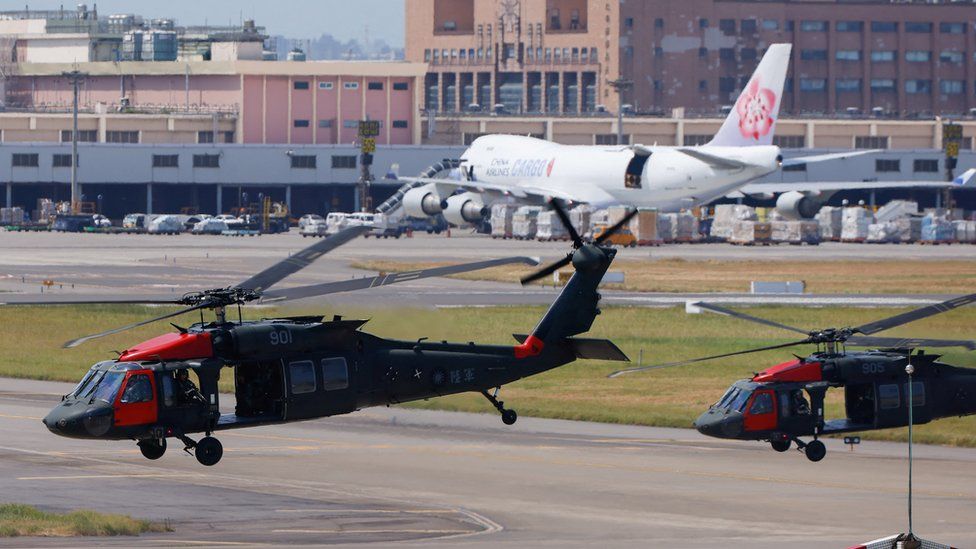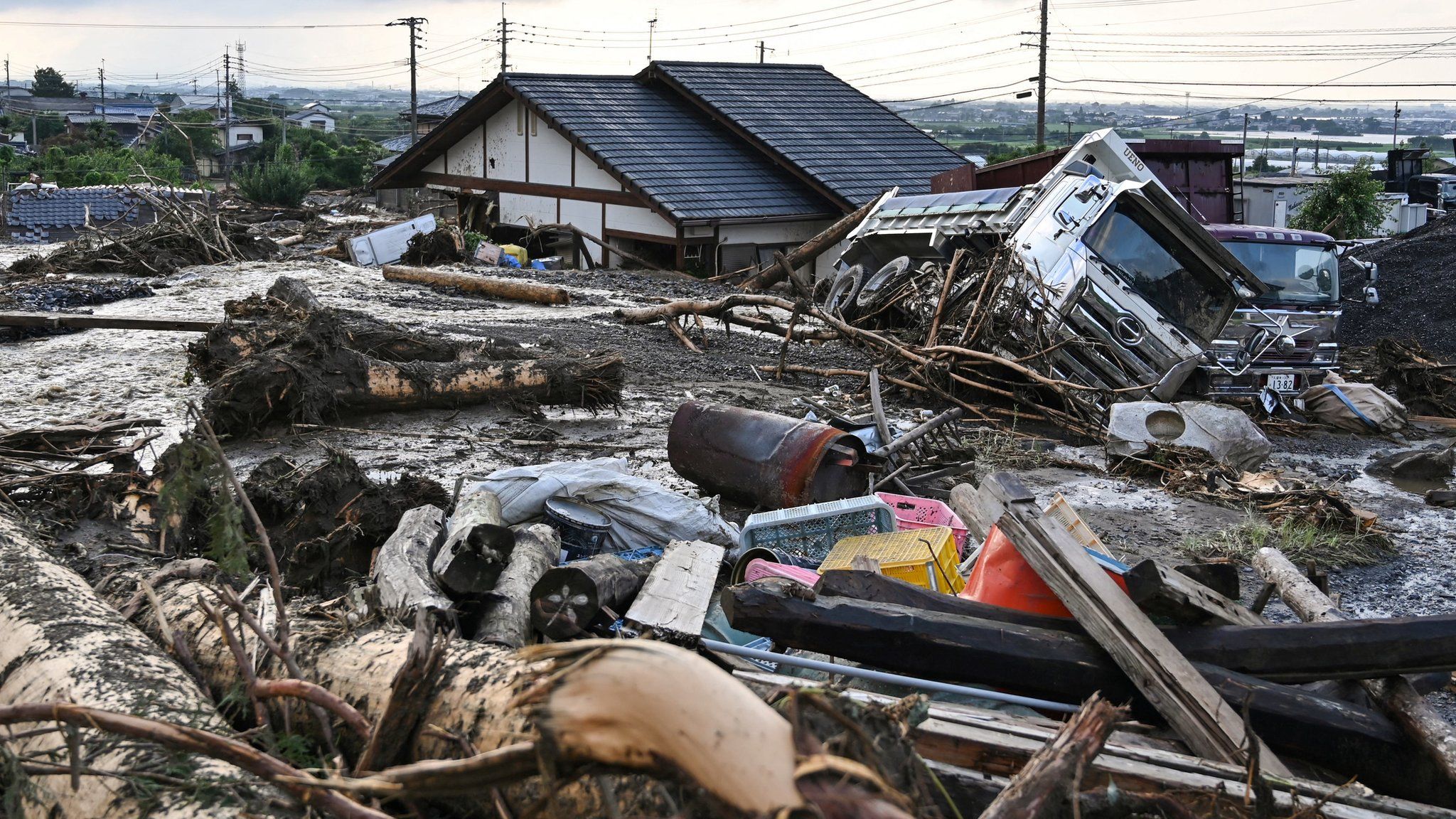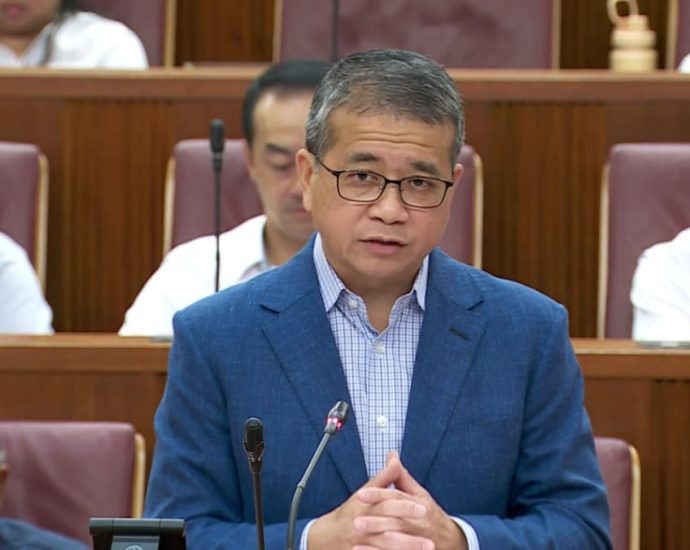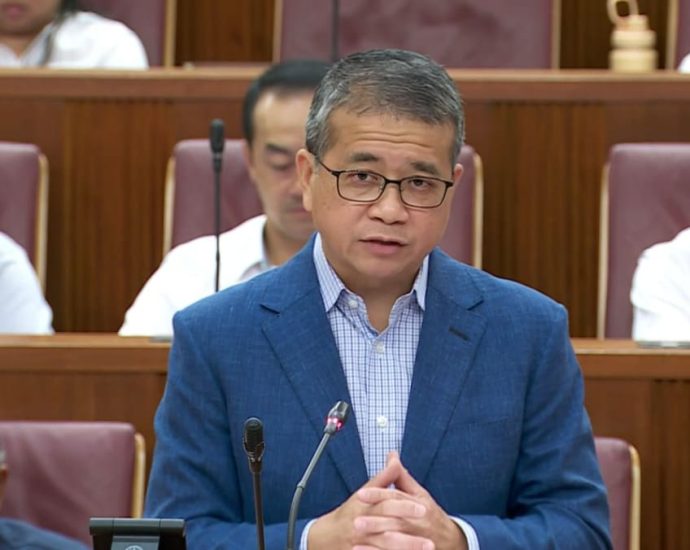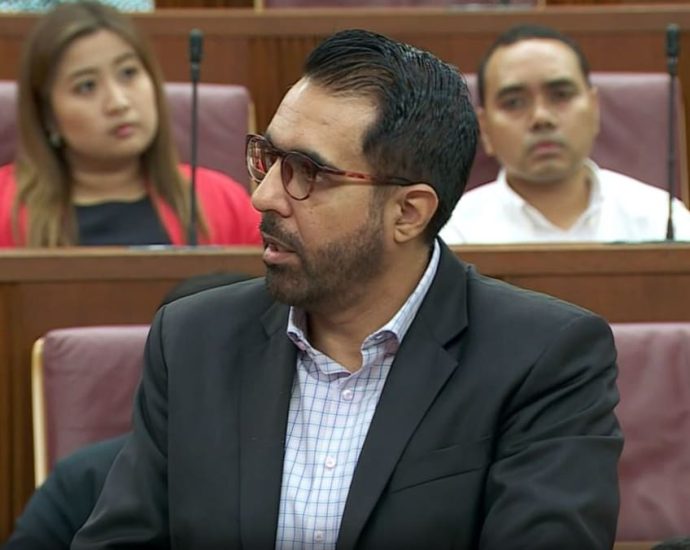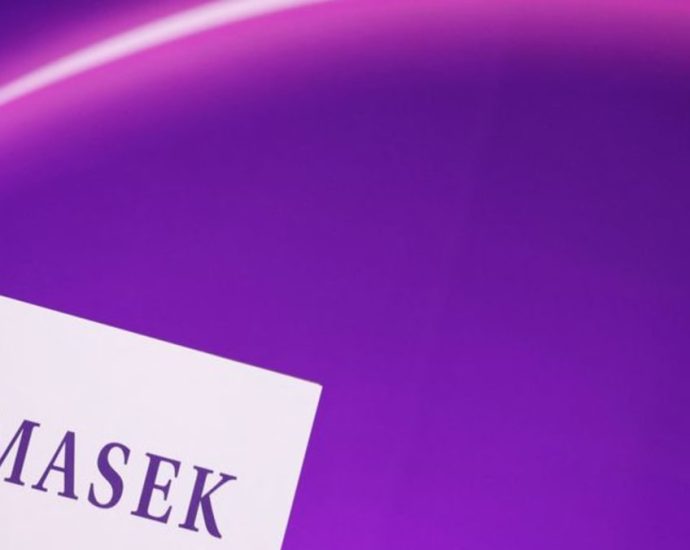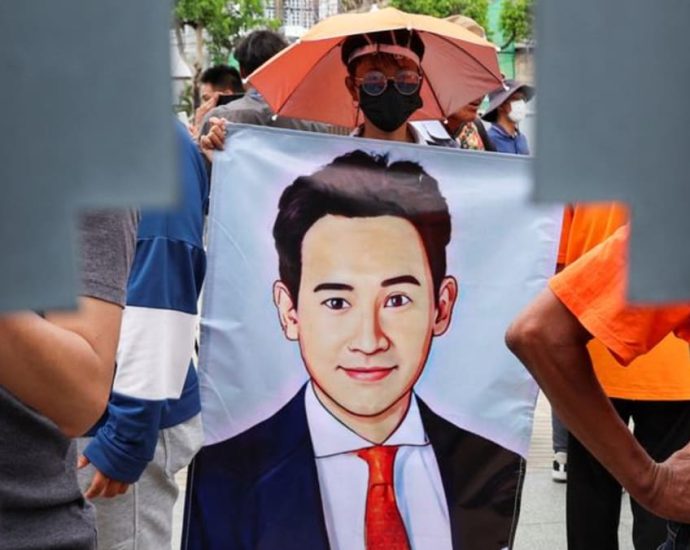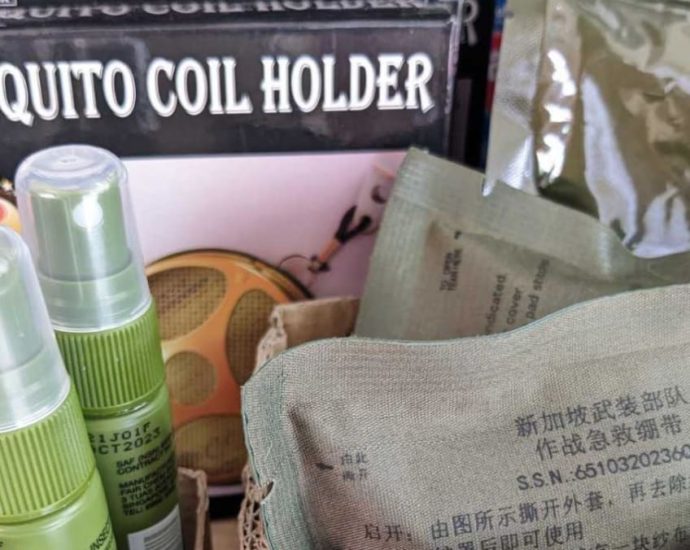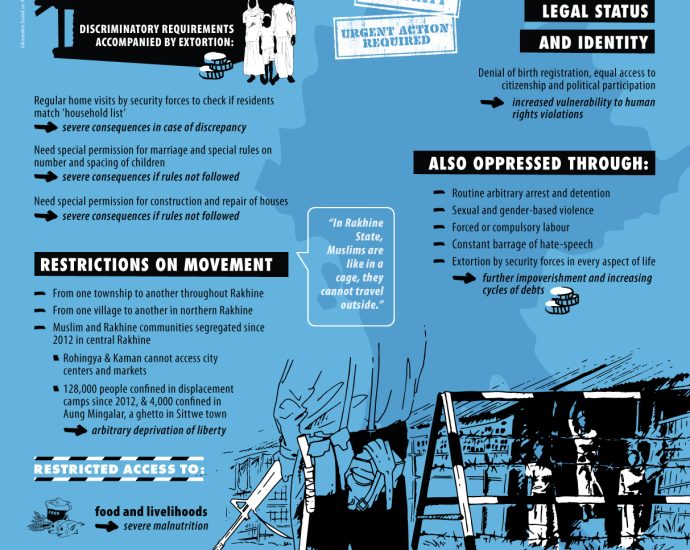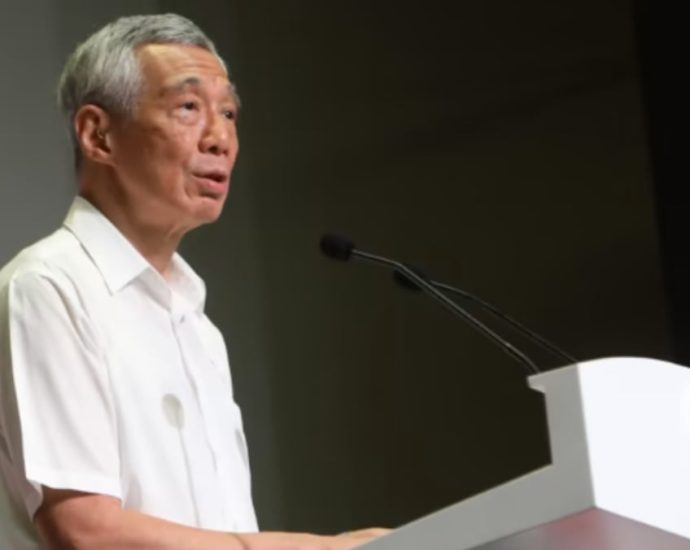Typhoon Khanun slams Okinawa after two deadly East Asia storms
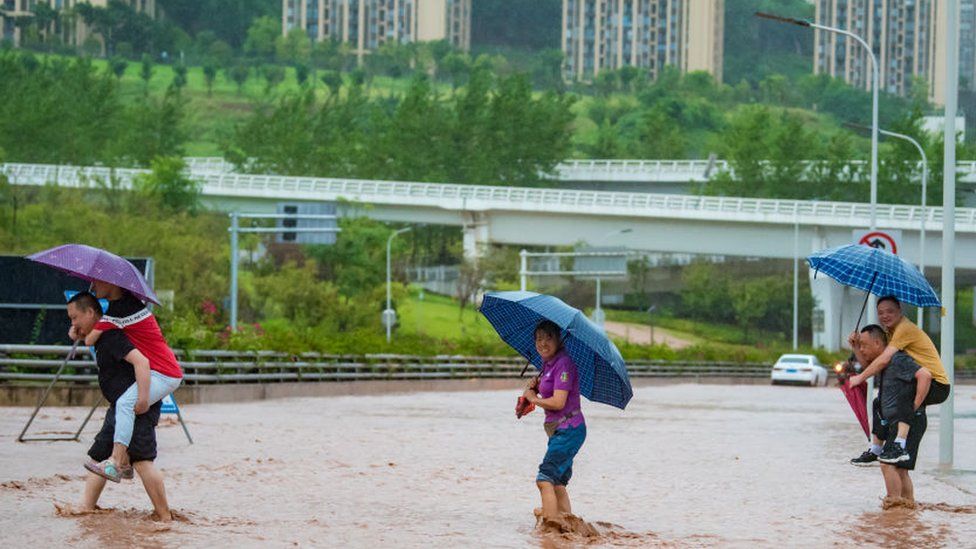 Getty Images
Getty ImagesA typhoon has lashed southern Japan, forcing evacuations and cutting off power to one-third of homes on the Okinawa islands.
Slow-moving Khanun – the third typhoon to hit east Asia in as many weeks – threatens to worsen the heaviest rains in Beijing in more than a century.
The deluge has killed at least 34 people in China so far.
Experts say that extreme weather events like this will become more frequent because of global warming.
Khanun follows two other typhoons, Talim and Doksuri, a super storm, which also drenched the Philippines and Taiwan, killing more than 30 people, in the last few weeks.
It was expected to make landfall on China’s northeast coast on Wednesday but forecasts now say it is more likely to turn towards the Japanese mainland without hitting China.
Japan’s tropical Okinawa islands are expected to face the brunt of Khanun’s 252kmh (156mph) gusts on Wednesday.
About 20,000 people have been advised to evacuate and nearly 900 flights have been cancelled at Okinawa’s Naha airport. This is peak tourist season for the island. Such strong storms are rare at this time of the year in Japan.
But climate scientists have long warned that global warming would increase the intensity and frequency of storms and heatwaves, both of which have hit parts of Asia in the past month.
Winston Chow, a professor in urban climate at Singapore Management University, likens the extreme weather to a game of roulette, where people place bets on red and black squares. He says the chances of an extreme weather event occurring – that is, a ball landing on a red square – have increased because of climate change.
“The more emissions we put out, the more black squares turn red, so the odds are we will land more frequently on the red every year,” he said.
The combined effect of three storms has drenched the Chinese capital Beijing and its neighbouring regions such as Tianjin and Hebei province since late last week. About 974,400 people have been evacuated in Beijing and Hebei, according to state media.
In the hard-hit foothill villages of Beijing’s Mentougou district, images published on state media showed residents shovelling mud out of their homes while authorities cleared roads and bridges of rocks and uprooted trees.
Beijing alone has experienced the “heaviest rainfall in 140 years” over the past few days, breaking the record set in 1891, according to officials,who have warned of more “significant rainfall”.
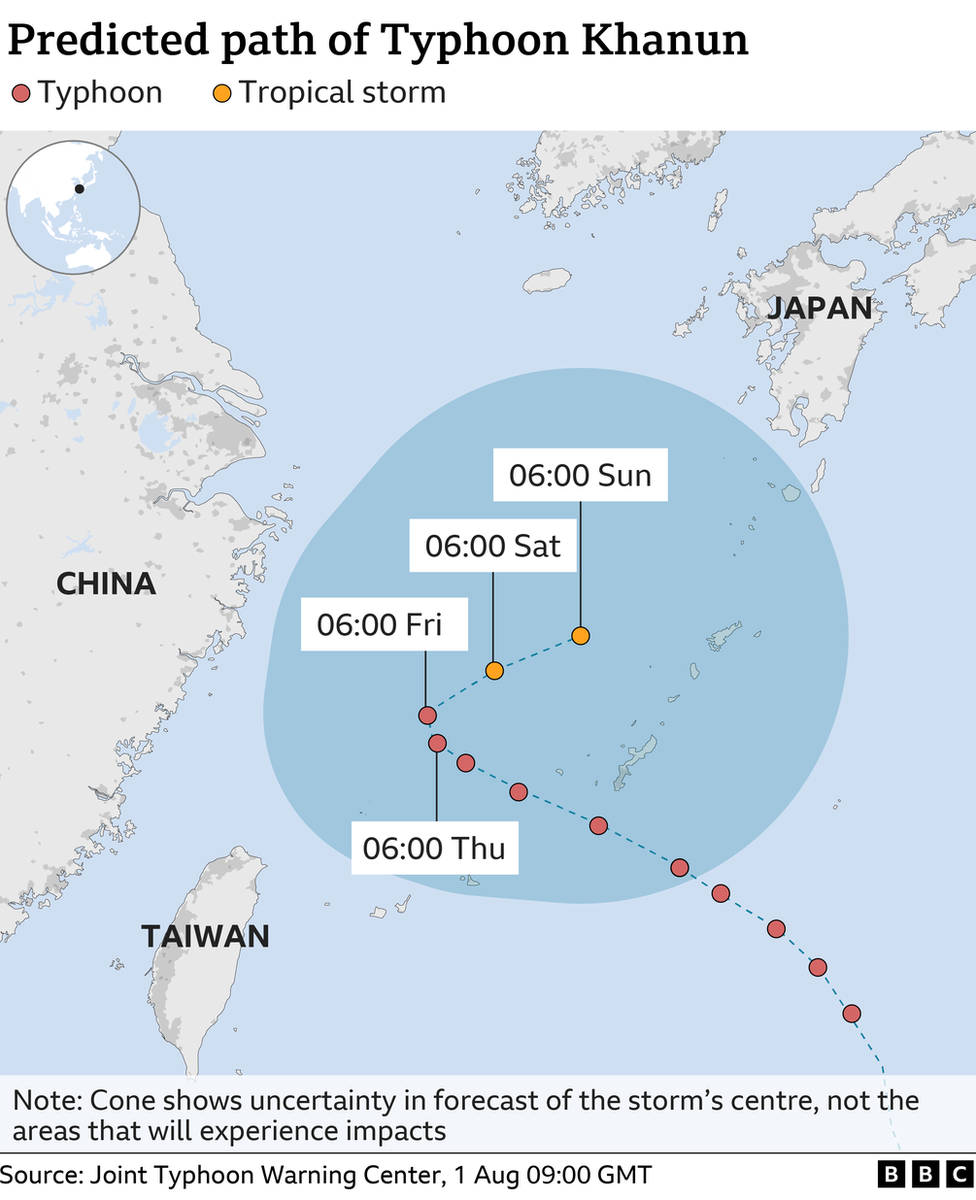

In the Philippines, large suburbs in the capital of Manila are still submerged, displacing about 300,000 people as rivers swell and dams threaten to spill over.
Last week, 26 people died after a ferry capsized in rough seas south of Manila as Doksuri drifted away from the country’s west coast and Khanun gathered strength in the east.
The storms have also destroyed infrastructure and sparked fires and floods across the region, forcing intermittent closures of schools and businesses.
Before the typhoons, large parts of Asia were hit by sweltering heatwaves.
More than 9,000 people across Japan were hospitalised for heatstroke in the middle of July, while parts of China recorded record-high temperatures.
A study published in 2021 by the Frontiers in Earth Science, which investigated the impact of typhoons between 1979 and 2016, projected that typhoons could double in destructive power over land by the end of the 21st century.
Related Topics
Three more cases of âinappropriateâ money management uncovered by People’s Association but no funds lost: Edwin Tong

SINGAPORE: The People’s Association (PA) has identified three more instances where an “inappropriate practice of monies management” took place, after the Auditor-General’s Office (AGO) reported similar issues at two grassroots organisations.
After the AGO’s audit, the PA started conducting checks that were similar in scope and time period, said Minister for Culture, Community and Youth Edwin Tong in parliament on Wednesday (Aug 2).
“Thus far, we have identified three other cases in which similar inappropriate practice of monies management for welfare assistance schemes were adopted,” he said in response to parliamentary questions raised by Members of Parliament following the AGO’s report.
“In all of these cases, there was also no loss of funds,” he added, noting that the practices have since stopped.
Staff and volunteers have been counselled on the need to adhere strictly to governance processes, Mr Tong said, acknowledging challenges in administering schemes and other government programmes.
The PA is continuing to strengthen its internal governance and oversight of key processes, he said.
PA is a statutory board under the Ministry for Culture, Community and Youth, and has a network of more than 2,000 grassroots organisations.
AGO REPORT
For its report for the financial year 2022/2023, the AGO chose to audit welfare assistance schemes by PA for the period April 1, 2019 to May 31, 2022.
It found inappropriate money management practices at two grassroots organisations.
The first case concerned money for welfare distribution at festive events where, over more than three years, S$707,000 (US$528,000) was transferred to personal bank accounts so that staff could withdraw it for cash disbursements.
Money ranging from S$10,000 to S$200,000 was transferred over seven instances.
When auditing the disbursement procedure of the scheme, AGO found that a crossed cheque was issued to a staff member. The cheque was brought to the bank, processed and deposited into the staff member’s account.
Next, the staff member would withdraw the deposit amount in cash over the bank counter, accompanied by another staff member. A third staff member would verify that the money had been withdrawn.
“The standard procedure would have been to do all of the above, except one step, which is for the cheque to be an uncrossed one made out to the staff member, with the words ‘or bearer’ crossed out,” said Mr Tong.
“When the uncrossed cheque is brought to the bank, the cash would then be withdrawn immediately over the counter and retained by the staff concerned and then applied to the scheme for disbursement.”
He noted that the money withdrawn was duly checked and verified, and AGO found no evidence of loss or misappropriation.
“The staff concerned explained that it was thought that the additional step, in using the crossed cheque, was taken to better account for the money,” Mr Tong said.
The practice stopped once AGO flagged it during the audit.
Three more cases of âinappropriateâ money management uncovered by People’s Association: Edwin Tong

SINGAPORE: The People’s Association (PA) has identified three more instances where an “inappropriate practice of monies management” took place, after the Auditor-General’s Office (AGO) reported similar issues at two grassroots organisations.
After the AGO’s audit, the PA started conducting checks that were similar in scope and time period, said Minister for Culture, Community and Youth Edwin Tong in parliament on Wednesday (Aug 2).
“Thus far, we have identified three other cases in which similar inappropriate practice of monies management for welfare assistance schemes were adopted,” he said in response to parliamentary questions raised by Members of Parliament following the AGO’s report.
“In all of these cases, there was also no loss of funds,” he added, noting that the practices have since stopped.
Staff and volunteers have been counselled on the need to adhere strictly to governance processes, Mr Tong said, acknowledging challenges in administering schemes and other government programmes.
The PA is continuing to strengthen its internal governance and oversight of key processes, he said.
PA is a statutory board under the Ministry for Culture, Community and Youth, and has a network of more than 2,000 grassroots organisations.
AGO REPORT
For its report for the financial year 2022/2023, the AGO chose to audit welfare assistance schemes by PA for the period April 1, 2019 to May 31, 2022.
It found inappropriate money management practices at two grassroots organisations.
The first case concerned money for welfare distribution at festive events where, over more than three years, S$707,000 (US$528,000) was transferred to personal bank accounts so that staff could withdraw it for cash disbursements.
Money ranging from S$10,000 to S$200,000 was transferred over seven instances.
When auditing the disbursement procedure of the scheme, AGO found that a crossed cheque was issued to a staff member. The cheque was brought to the bank, processed and deposited into the staff member’s account.
Next, the staff member would withdraw the deposit amount in cash over the bank counter, accompanied by another staff member. A third staff member would verify that the money had been withdrawn.
“The standard procedure would have been to do all of the above, except one step, which is for the cheque to be an uncrossed one made out to the staff member, with the words ‘or bearer’ crossed out,” said Mr Tong.
“When the uncrossed cheque is brought to the bank, the cash would then be withdrawn immediately over the counter and retained by the staff concerned and then applied to the scheme for disbursement.”
He noted that the money withdrawn was duly checked and verified, and AGO found no evidence of loss or misappropriation.
“The staff concerned explained that it was thought that the additional step, in using the crossed cheque, was taken to better account for the money,” Mr Tong said.
The practice stopped once AGO flagged it during the audit.
Pritam Singh questions ‘suspicious’ circumstances of release of Tan Chuan-Jin’s hot mic video

SYLVIA LIM, LEONG MUN WAI QUESTION INDRANEE
MP Sylvia Lim (WP-Aljunied) asked Ms Indranee to clarify whether she was exercising any authority as Leader of the House when she communicated to Mr Tan that an apology was necessary.
“The Speaker is the master of the chamber, he has the power to punish us. But it’s a question mark as to who has the power to punish him if there is any unparliamentary conduct,” she said.
Ms Lim said that from her research into other jurisdictions, a motion of regret filed by backbencher MPs was the usual practice.
Ms Indranee replied that she was not exercising any authority over Mr Tan, and had only indicated her view to him as Leader of the House.
She added that she did not have the power to conclude the matter, and that if any MP had another view, it was up to them to pursue it.
Non-Constituency MP Leong Mun Wai asked why the Leader of the House did not think it necessary for Foreign Minister Vivian Balakrishnan to formally apologise when he was caught making comments about Mr Leong on a hot mic.
Mr Leong was referring to a previous incident in which a voice was heard saying “he’s illiterate” and “seriously, how did he get into (Raffles Institution)? Must have been a lousy school” during a livestream of a parliamentary sitting.
Dr Balakrishnan later apologised to the Progress Singapore Party politician in a call.
Ms Indranee said that typically, the Speaker rules on such matters and it is for the person who has the right to complain – in that case, Mr Leong – to raise the issue.
“I have raised it here simply because it is the Speaker who had uttered the words, and other members can raise a complaint if they wish,” she said.
“But I felt that it was appropriate that as Leader, I should address it. And of course, he’s no longer here in parliament to deal with it, so somebody has to raise it.”
Market indices are not âdirect benchmarksâ for Temasekâs financial performance: Chee Hong Tat

SINGAPORE: Market indices do not serve as “direct benchmarks” to assess the financial performance of government investment firm Temasek Holdings, said Senior Minister of State for Finance Chee Hong Tat on Wednesday (Aug 2).
“Broadly speaking, Temasek has outperformed these market indices over the long term,” he told the House.
“But it is important to recognise that Temasek is not a portfolio fund manager and the MSCI indices are not direct benchmarks for Temasek’s performance.”
Mr Chee noted that Temasek began its investments with Singapore companies before expanding its portfolio to include firms in other parts of Asia and more recently, North America and Europe.
This means the state investor’s portfolio remains Asia-centric for now, with the region making up two-thirds of its exposure. On the other hand, the composition of market indices varies “significantly” from Temasek’s portfolio, Mr Chee added.
Citing the MSCI World Index and MSCI All Country World Index (ACWI) as examples, he noted that these indices have larger weightages to the US stock market, which has done well over the past decade when compared to Asian stock markets.
“This is why there will be occasions when Temasek’s returns are higher than the MSCI World Index and ACWI, and other occasions when the returns are not as high as these indices,” he said.
Mr Chee was responding to parliamentary questions on Temasek’s latest annual results, and how they measure up to other market benchmarks and other sovereign wealth funds.
For the financial year ended Mar 31, Temasek’s net portfolio was valued at S$382 billion (US$287 billion), down 5.2 per cent or S$21 billion from the record S$403 billion it achieved a year ago.
Its one-year total shareholder return, which takes into account all dividends distributed to the shareholder minus any capital injections, turned negative to -5.07 per cent from the 5.81 per cent gain a year ago.
This performance for the past year can largely be attributed to a fall in equity valuations, both in the public and private markets, the state investor said in its latest annual review.
Temasek also registered its first net loss due to a change in accounting standards, as it had to take into account unrealised mark-to-market losses posted by companies in which it had less than a 20 per cent stake.
Thailand’s election-winning Move Forward party no longer part of eight-party alliance
BANGKOK: Thailand’s election-winning Move Forward Party is no longer part of an eight-party alliance that was formed after a May general election in an attempt to form the country’s next government, the leader of an alliance member said on Wednesday (Aug 2). “Pheu Thai called us to tell us thatContinue Reading
Woman jailed for tricking teacher into ‘investing’ S$145,500 in fake SAF eMart business

SINGAPORE: After getting to know a teacher who bought items from her Beach Road shops for his National Cadet Corps (NCC) students, a woman lured him into placing large investments with her for a non-existent business.
Over about five months in 2015, the teacher gave S$145,500 (US$108,300) to the woman for her supposed business supplying military items to the Singapore Armed Forces (SAF) eMart, which sells army goods to servicemen.
Jahabar Nachia Mohamed Abdullah, 67, was sentenced to two years and four months’ (28 months) jail on Wednesday (Aug 2) for her crimes. She had claimed trial but was found guilty of 10 charges of cheating.
To date, she has only made restitution of S$7,200 to the victim.
The court heard that the victim, Mr Kasmuri Hambali, was an English teacher in charge of the co-curricular activity of NCC at his school.
He got to know the accused, Jahabar, in the year 2000 when he bought items from her shops at Beach Road for his NCC students.
In 2015, Jahabar asked Mr Kasmuri if he wanted to do business, saying she had been supplying military goods to SAF eMart “for a very long time”, but wanted to increase her capital so she could buy more items to supply to SAF eMart.
Mr Kasmuri decided to invest in the business, as he believed that Jahabar’s business was doing well, and Jahabar claimed that it was a “fast turnover business”.
She promised to give him some share of the profits.
Mr Kasmuri began giving Jahabar “investments” by cash or cheque, with the agreement that he was to receive his investments back on top of any small profits.
However, after giving Jahabar a total of S$145,500 in investments between March and September 2015, he did not get any money back.
When he asked Jahabar for the payments, the woman would keep delaying. Eventually, Kasmuri lodged a police report in November 2015.
He later said that if he knew there was no such business supplying goods to the SAF eMart, he would not have given Jahabar all those payments.
At trial, Jahabar claimed that Mr Kasmuri’s payments were “loans” extended to her to help her fulfil customers’ orders at her Beach Road shop.
She claimed that three overseas customers failed to pay her as promised, and therefore she was unable to repay Mr Kasmuri.
The prosecution charged that Jahabar was “not a witness of truth, constantly changing her version of events to suit her case”.
The prosecutor asked for at least three years’ jail for Jahabar, citing a “disturbing growth in the prevalence of scams”, with about 31,700 cases in 2022 compared with about 9,500 in 2019.
In particular, the police identified investment scams as one of the top five types of scams in Singapore in 2022, said the prosecutor.
For each charge of cheating, Jahabar could have been jailed for up to 10 years and fined.
âFrom victim to victorâ: A Rohingya journey to Myanmar government
Despite a lifetime of struggle, Rohingya rights activist Aung Kyaw Moe believes there’s a solution to every problem, even when things are beyond his control.
In June, his persistence led to a landmark moment with his ascension from an advisory role to become the deputy human rights minister to the National Unity Government (NUG). His appointment within the exiled civilian administration – which operates in parallel to the military junta that ousted democratically elected leaders in the 2021 coup – marks the first time a Rohingya representative has held a ministerial position in any Myanmar government.
“I believe that regardless of the challenges, you have all the capacity to be a victor,” he said. “It’s all a matter of how you transform yourself from a victim to a victor.”
Aung Kyaw Moe has advocated for the rights of the stateless Muslim minority group for more than a decade. He has more than 15 years of experience working in U.N. agencies and non-governmental organisations in Southeast Asia, Afghanistan and Liberia and won several human rights awards, including the prestigious E.U. Schuman Award in 2019.
But although he now has a say in the shadow government’s decisions, the establishment of Rohingya rights in Myanmar is far from straightforward. The embattled NUG still lacks control over territory in Myanmar and faces an authoritarian military that denies the Rohingya citizenship and basic rights.
In 2017, the Myanmar military conducted a brutal crackdown on the predominantly Muslim majority, pushing more than 700,000 Rohingya into Bangladesh. Today, about a million Rohingya refugees remain there, living in squalid camps with uncertain futures just over the border from their native Rakhine State in western Myanmar.
The persecution of the Rohingya minority is deeper-rooted still, dating back to warfare and displacement in the late 1700s. Later on, post-colonial religious segregation and discrimination caused this population to be considered illegal immigrants in their own country. The government of Myanmar officially categorised them as “Bengali” in 1982, stripping them of citizenship rights and forcing them to live without basic human rights ever since.
Born in Rakhine State in 1973, Aung Kyaw Moe witnessed decades of oppression and violence against the Rohingya people. He began activism as a student when the discriminatory policies against his ethnic group felt increasingly unfair.
“At that time, Rakhine State was an open prison with strict movement restrictions for people like us,” Aung Kyaw Mow said of his youth. “The inspiration [to work in human rights] came from the hardship and trauma.”
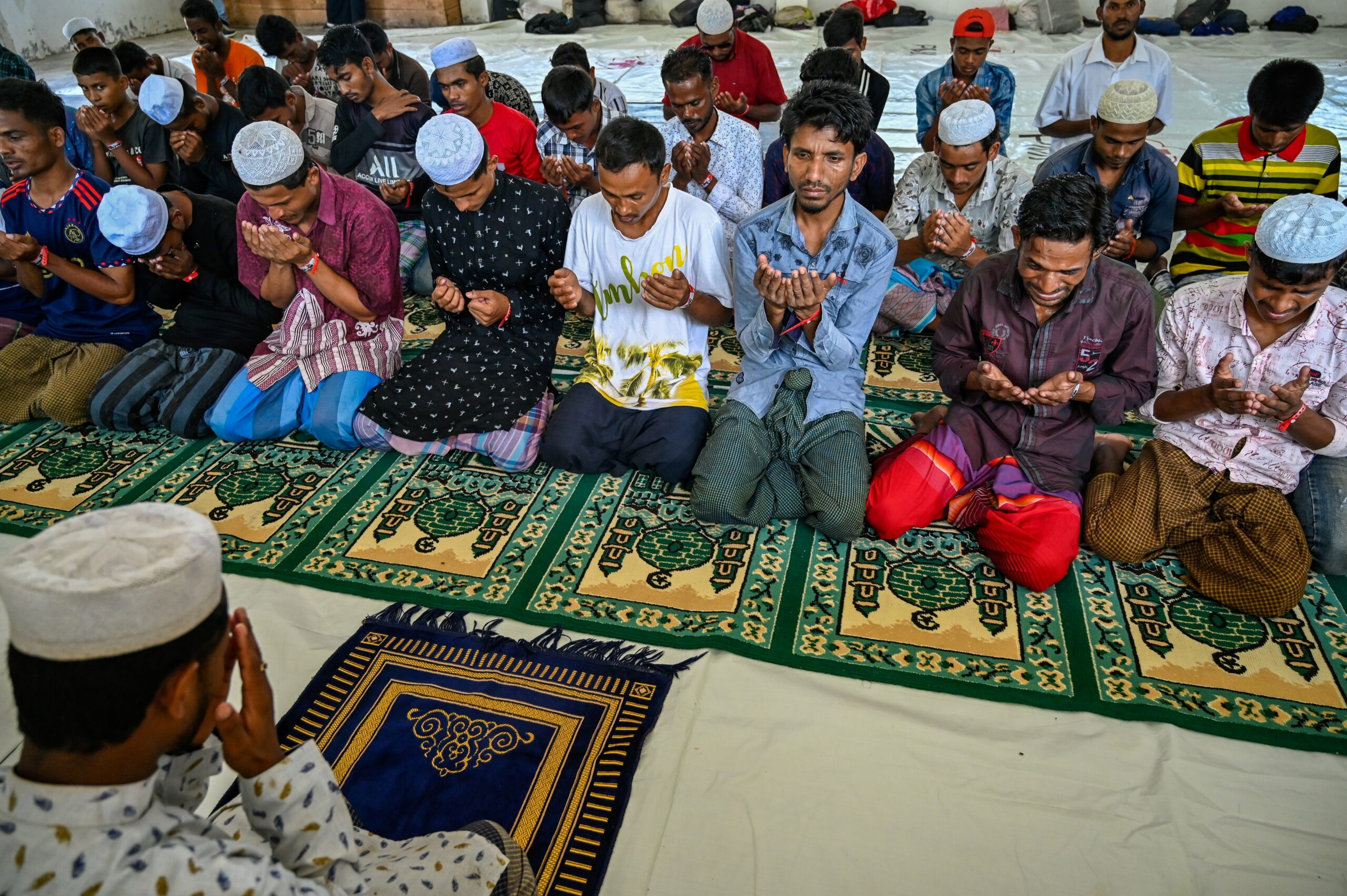
Despite growing up with limited educational opportunities due to his Rohingya identity and religious minority status, Aung Kyaw Moe managed to complete his bachelor’s degree in Yangon. But further education seemed to not be an option for him in Myanmar.
“[As a Rohingya] there is a double layer of discrimination to overcome in order to truly become who you want to be and influence others,” he said. “I then began to look for alternative ways to achieve my goals.”
He went on to graduate with a master’s degree from Deakin University in Australia. He later participated in leadership programmes through the United States Institute of Peace and the Dalai Lama Fellowship.
Facing threats to his safety due to the nature of his advocacy for the Rohingya, Aung Kyaw Moe also fled Myanmar multiple times and separated from family members as early as 1992, with some of them staying in Rakhine, others fleeing to Yangon or neighbouring Bangladesh. Despite the difficulties, he continued activism while being in and out of the country, testifying about atrocities before the U.N. Human Rights Council and International Criminal Court.
“It’s hardly acceptable for me. … We could have saved him from being killed.”
Aung Kyaw Moe, speaking of his elder brother
But his choices also forced him to take a strong stand about cutting ties. Aung Kyaw Moe hasn’t been in touch with his close family members for years to ensure their anonymity and safety from persecution.
That may not have been enough. Unknown assailants murdered his older brother Than Myint in June near a Yangon mosque. Aung Kyaw Moe believes the killers are likely affiliated with extremist groups linked to the military government.
“He was just a simple person who was making his life through a small pharmacy that he ran,” he said of his brother.
Though Than Myint had insisted that his younger brother not worry for his safety, Aung Kyaw Moe said he’d always been concerned about him.
“It’s hardly acceptable for me because there were things I could do to push him to relocate to a different country, at least to Thailand,” he said. “We could have saved him from being killed.”
But his brother was not his only loss. Aung Kyaw Moe also lost his father in 2012. His father had been arrested and, shortly after his release, suffered an illness that left him paralysed. When he was unable to receive treatment at local hospitals, the family brought him to Bangladesh, where he received only palliative care until he felt strong enough to cross the border back to Myanmar.
However, Aung Kyaw Moe said the reentry was disastrous – just a few steps on Myanmar soil were enough for his father to fear a new arrest so much that he immediately died of a heart attack.
“That was a big loss for me,” Aung Kyaw Moe recounted. “I was not able to go to the funeral because of the movement restrictions and my activism.”
Despite his immense suffering and hardships, the activist’s first-hand accounts of the crises facing the Rohingya brought global attention to their plight.
One of the most controversial decisions in the course of this, according to him, was whether to join the NUG three years ago as the first Rohingya advisor on human rights in parliament. Criticism came from some Rohingya commentators, who believed this to be just a tokenistic gesture to the international community.
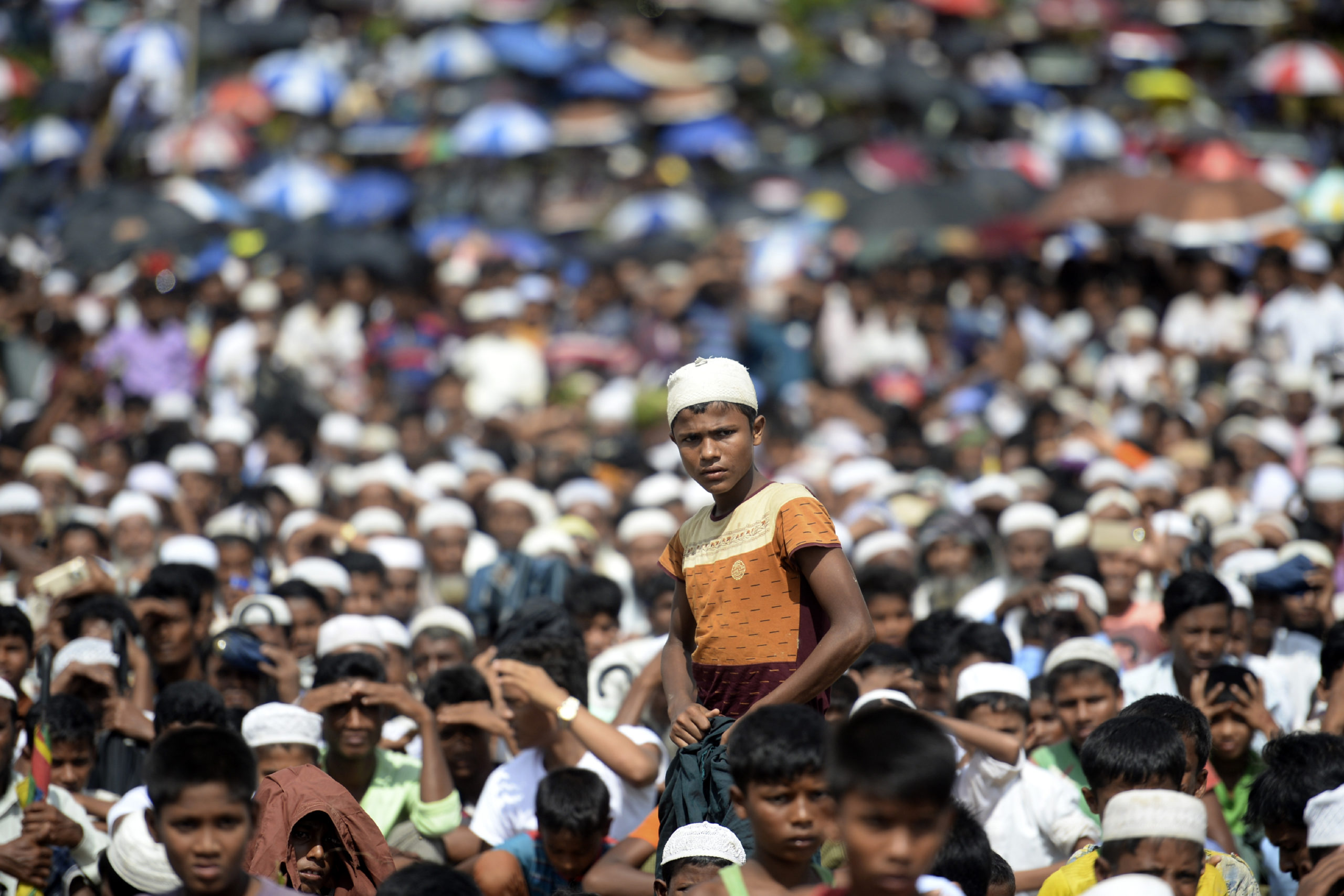
But Aung Kyaw Moe stands by his involvement, seeing it as a stepping stone for the future of the Rohingya people.
“We belong to Myanmar and we are part of this country,” he asserted. “Despite whatever happens to us, we don’t want to be a bystander or audience in this historic moment. We will contribute in whatever capacity we are in.”
He sees the inclusion of a Rohingya representative in the cabinet-in-exile as a step towards giving the community a voice in decisions that affect their fate. Aung Kyaw Moe is now well-positioned to shape policy discussions on key issues including the safe return of refugees and restitution for lost lands and properties, as well as constitutional reforms to grant the Rohingya full citizenship and political representation.
Despite everything, Aung Kyaw Moe says he’s hopeful these goals and more can be achieved through non-violent civil disobedience.
“I’m someone who has scars and I know the pain enough to understand the suffering of others,“ he said. Because he went through similar experiences to his fellow Rohingya, he believes he can empathise better with the population in his new role as NUG deputy human rights minister.
“I will be working for the benefit of my people,” he said. “It’s now on my shoulder to be making it a reality despite … all this political turmoil and shifting political landscape in Myanmar.”
CPIB did not announce Iswaran’s arrest initially as it wanted to establish more facts, hear his side: Chan Chun Sing
CPIB DOES NOT REQUIRE PM’S CONCURRENCE TO CONDUCT INVESTIGATIONS On CPIB’s investigations, Mr Leong Mun Wai (NCMP-PSP) and Mr Louis Chua (WP-Sengkang) asked whether all of its investigations require the Prime Minister’s concurrence and if the bureau is obliged to seek his concurrence to open formal investigations for potential offencesContinue Reading
PAP stance on corruption ‘has not changed under my charge, and it wonât under my successor’: PM Lee
SINGAPORE: The People’s Action Party (PAP) government has always dealt with corruption and allegations of improper conduct thoroughly, transparently and by applying the full force of the law, Prime Minister Lee Hsien Loong said on Wednesday (Aug 2), pledging that this will continue when Deputy Prime Minister Lawrence Wong succeedsContinue Reading

